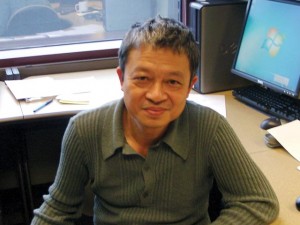
Higher Engineering Education Alliance Program
HEEAP expands program, partners
The Higher Engineering Education Alliance Program continues to attract industry support. In addition to new partners Cadence and Danaher, founding partners USAID and Intel announced a $2 million expansion to include a vocational track and Siemens announced a $71 million in-kind software grant.
Through HEEAP, the United States Agency for International Development (USAID), ASU’s Ira A. Fulton Schools of Engineering, Portland State University’s Maseeh College of Engineering and Computer Science (PSU), Intel, Siemens and other industry partners have teamed up with eight top technical universities and colleges in Vietnam on a collaborative initiative to improve the quality of Vietnam’s higher education curriculum and support the country’s growing high-tech industry.
HEEAP works closely with Vietnam’s Ministry of Education and Training, the Ministry of Labor and Social Affairs and leadership at partner universities and technical colleges to implement programs and broad infrastructure that supports faculty training, curricula development and hands-on student learning experiences. Students gain the technical expertise, language proficiency and the soft skills as well as competencies needed to succeed.
HEEAP was initiated in 2010 with funding from USAID, Intel and ASU. That same year, 25 professors from five universities attended a six-week Summer Institute at ASU. This first cohort is implementing changes in curriculum, designing new courses and revamping existing courses and labs based on learning outcomes. Additional faculty will be trained each year and all will return home to train their peers on new methodologies.
Educational advances emerge from first outputs of HEEAP

Son Thanh Nguyen is a senior lecturer and faculty in computer science engineering at Ho Chi Minh City University of Technology in Vietnam
Son Thanh Nguyen, senior lecturer and faculty in computer science engineering at Ho Chi Minh City University of Technology in Vietnam, spent three months at ASU’s Tempe campus as part of the HEEAP program. Nguyen was part of the inaugural group of 25 Vietnamese faculty members participating in an intensive six-week faculty development program held at ASU in July and August 2010. As a result of the program, Nguyen came back to ASU to work directly with faculty at Fulton Engineering on specific initiatives.
During his stay at ASU, Nguyen worked closely with the School of Computing, Informatics, and Decision Systems Engineering. He made observations in the labs, attended lectures and participated in capstone projects.
Nguyen says that ASU’s redesign of its computer science program has provided a roadmap for his own efforts, enabling him to take home practical methods and tools suitable to the educational system in Vietnam.
Nguyen and other educators are working toward a plan that will enable their programs to reach and pass the Accreditation Board for Engineering and Technology (ABET) standards.



































